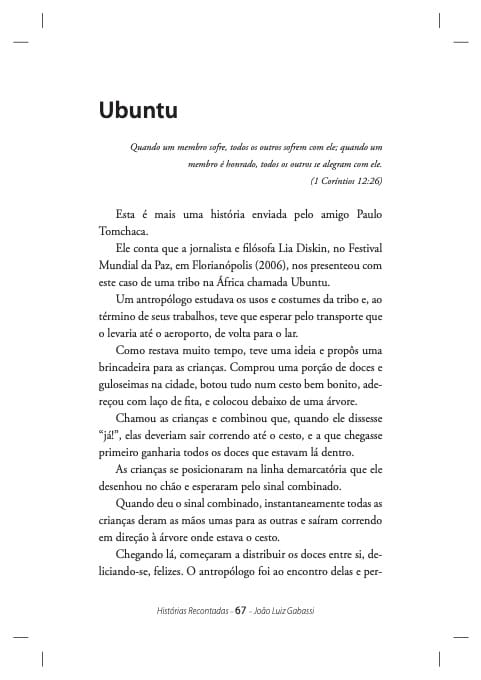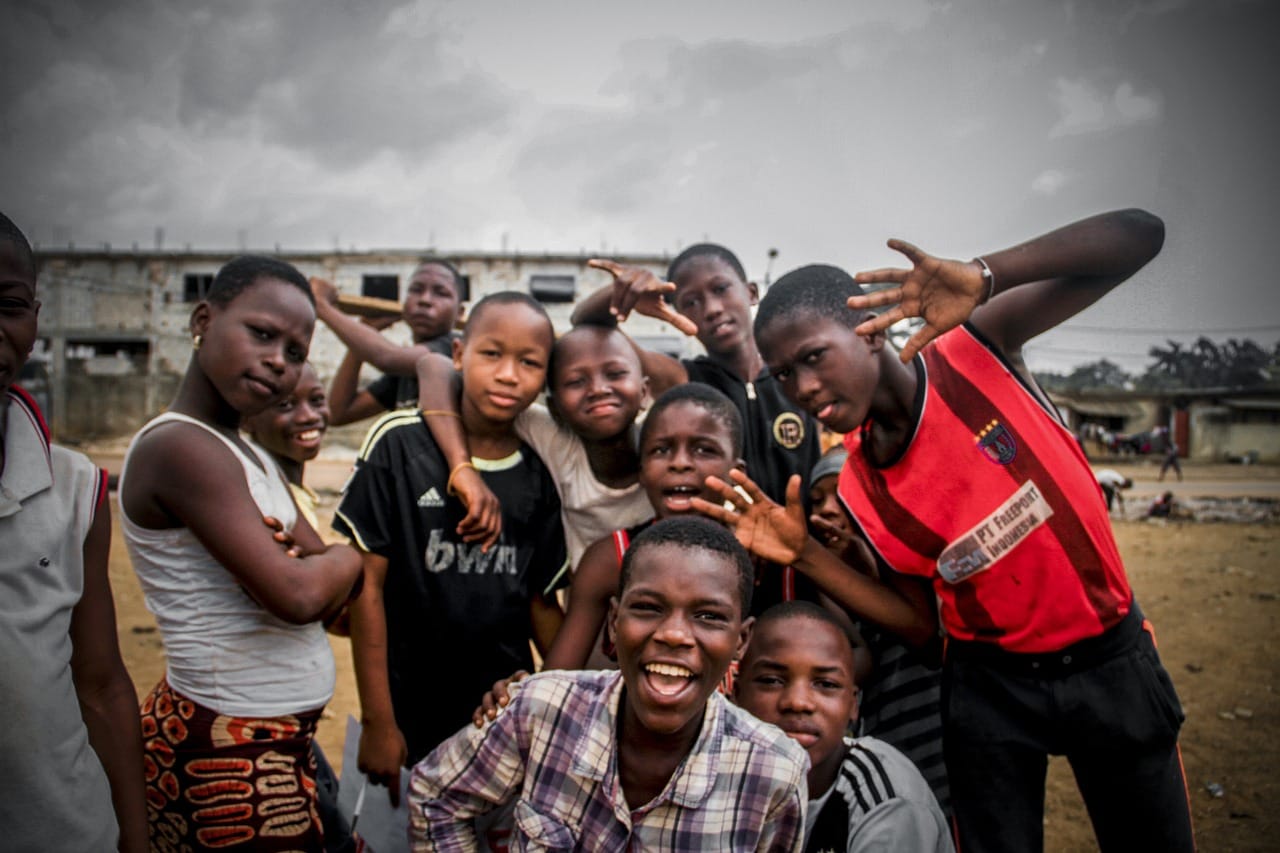At the beginning of August 2023, a story about an anthropologist and African children who, as part of an experiment, chose cooperation over competition, was widely circulated on the Internet, which incredibly surprised the scientist. We checked whether this story is supported by facts.
August 1–3 users Telegram, "VKontakte», YouTube, Facebook And others platforms massively shared posts about the anthropologist (in some cases TBC, that it was a British scientist) who conducted an experiment with children from an unnamed African tribe. He allegedly placed a basket of fruit under a tree and said that the first person to reach the tree would receive the entire basket. However, contrary to expectations, the children did not compete, but together approached the basket and divided the fruit equally. When the anthropologist asked them why they did this, they replied: “Ubuntu. How can one of us be happy when the rest are unhappy? At the end messages it is clarified that “ubuntu” in the language of this tribe means “I am because we are.”
The concept of “ubuntu”, which cannot be translated into one word, is characteristic of the cultures and languages of the Bantu group. On the tongue braid it will sound like "ubuntu" Swahili - “obuntu”, on Zulu - "umuntu". This concept is an important part of humanistic African philosophy, it means humanity expressed through cooperation and help, through community with other people. In modern Uganda, on the concept of obuntu bulamu based programs that help people with disabilities adapt to society. Preachers The ideas of Ubuntu were activists in the fight against the apartheid regime, ex-President of South Africa Nelson Mandela and Archbishop of the South African Anglican Church Desmond Tutu. In 2006, it was after a meeting with Tutu about the meaning of the word “ubuntu” in his speech reasoned The 42nd President of the United States, Bill Clinton, likely contributed to the popularity of the concept in the West.
In English, a story about an anthropologist and the concept of “ubuntu” has been spreading since 2012 - in blogs popular motivational trainers, V others posts in social networks And blogs and even in the one published in 2014 article a group of scientists from the Aristotle University of Thessaloniki. IN Russian-language Internet This story is also more than ten years old, and it exists in two versions, differing in the form of transliteration of the word ubuntu. Thus, in one of the first Russian-language publications in 2012 instead of “ubuntu”, the consonant word “obonato” was used, and in this form the parable ended up, in particular, in the Ukrainian edition published in 2015 textbook for 4th grade “I am in the world” (“I am in the world”). However, neither the name of the anthropologist nor the name of the tribe in whose language the concept of “ubuntu” or “obonato” is present is mentioned in the vast majority of sources in Russian or English.
Assuming that earlier versions of this story should have identified a tribe or language, and limiting the search dates to 2012, Verified found two posts on Russian And English languages in which the history of the concept of "ubuntu" is associated with specific African tribes - Xhosa and Zulu. The link to a certain Javier Canul in the English-language post suggests that the original should be looked for in the Spanish- and Portuguese-language segments of the Network.
And indeed, in Spanish this story became popular several months before the publication of translations into Russian and English. The Xhosa tribe is mentioned in all "Verified" Spanish-language publications of that time found, and the first of them dated August 27, 2011. But even more interesting are the posts in Portuguese, because they appeared no later than June of the same year and they mention the author who told the story - an Argentine journalist and cultural critic Leah Diskin.
Facebook users report that Diskin presented the story in 2006 at the Mundial da Paz festival in the Brazilian city of Florianopolis. In posts in Portuguese, the experiment is called simply the prank of an anthropologist who had nothing to do before leaving, and instead of fruit, sweets bought in the city appear. With a reference to Diskin in January 2011, this story appeared in book Histórias Recontadas (“Stories Retold”) by Brazilian business coach João Gabassi. The author reports that this story was, in turn, retold to him by his friend Paulo Tomczaka. Posts from Brazilian Facebook users repeat almost word for word a passage from Gabassi's book.

But, judging by the available data, Diskin’s story at the festival sounded different. In 2008 she wrote for UNESCO book called Vamos ubuntar? Um convite para cultivar a paz (“Are we Ubuntu? An invitation to develop the world”). The text indicates that Diskin borrowed this story from the work of the Spanish religious scholar and writer of Catalan-Indian origin Raymond Panikkar El espiritu de la politica (“On the Spirit of Politics”), and a brief retelling of it is given: “The cousin of one of Panikkar’s students went to teach in a small settlement in Africa as part of the Kennedy administration’s Third World aid program. Sensitive to issues of interventionism and wanting to avoid any arrogance, he was only willing to teach physical education classes. One day he took a box of sweets and invited his young students to take part in a race. He pointed to a tree that was a little further than a hundred meters away and said, “Do you see that tree over there? I'll say, 'One, two, three,' and you guys will start running towards it. Whoever comes first will win the candy." The students lined up, but at a signal, they held hands and ran together: they wanted to share the prize. Their happiness was happiness for everyone at once.”
"Verified" checked Panikkar's book. Diskin quotes the text quite accurately, replacing only the epithets, but omitting an important point - the author refers to the story as a tale: “Let me finish with an anecdote, which, like any anecdote, speaks at once about nothing and everything.”

On the pages of Vamos ubuntar? Diskin also writes about the Zulu and Xhosa concept of ubuntu. It can be assumed that she spoke about ubuntu in 2006 at the festival in Florianopolis. We do not know whether Paulo Tomczaka was present at the festival, but it was thanks to his retelling in Joao Gabassi’s book that the story received an almost final form - an anthropologist and the final phrase about ubuntu appeared in it. An unknown Spanish-speaking user replaced the sweets with a basket of fruits, and in this form the text became as viral as possible and was translated into other languages.
As for the version with the word “obonato”, such a form could not be found in any of the described Bantu languages “Verified”. Judging by the search results, this variation arose in Russian no later than April 2012 and only then in one of translations went to wandering on the Internet in other languages.
We also note that in recent years row Russian-language sources attributed to carrying out this supposed experiment to an Anglican missionary and ethnographer John Roscoe (1861–1932). Roscoe spent more than 25 years in Africa studying one of the main ethnic groups of Uganda, and wrote two major works: The Baganda; an account of their native customs and beliefs (“Baganda; a story about their customs and beliefs”, 1911) and Twenty-five Years in East Africa (“Twenty-five years in East Africa”, 1921). The missionary actually described in detail the life, rituals and customs of the Baganda tribe, including some characteristic features of social behavior and principles that fit into the “philosophy of Ubuntu.” But in his publications there is no mention of the experiment with a basket of fruit under a tree, nor are the words ubuntu or obuntu found. A search of scientific databases did not reveal a single mention of Roscoe or another anthropologist in connection with the story about children and ubuntu. The fact that the missionary’s name is absent from texts about Ubuntu in other languages suggests with a high probability that Roscoe, like Obonato, got into this story in Russian, and relatively recently.
Thus, there is no evidence that such an experiment was ever conducted, and the original story is described by Raymond Panikkar in 1999 as a "anecdote with meaning", without mentioning any anthropologist or experiment in his account. The story took its final form through a series of translations into other languages and additions from interpreters. However, this parable expresses the “philosophy of Ubuntu” so vividly and figuratively that it continues to be popular year after year.
Cover photo: kone cassoum from the site Pixabay
- The Bantu philosophy of “ubuntu” focuses on the power of community
- Honghu/Ubuntu in the Traditional Thought of Southern Africa
If you find a spelling or grammatical error, please let us know by highlighting the error text and clicking Ctrl+Enter.






